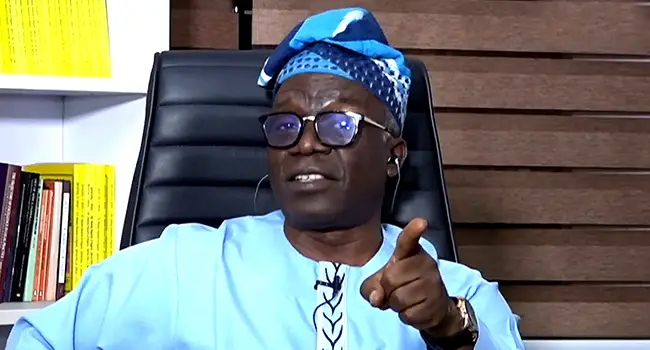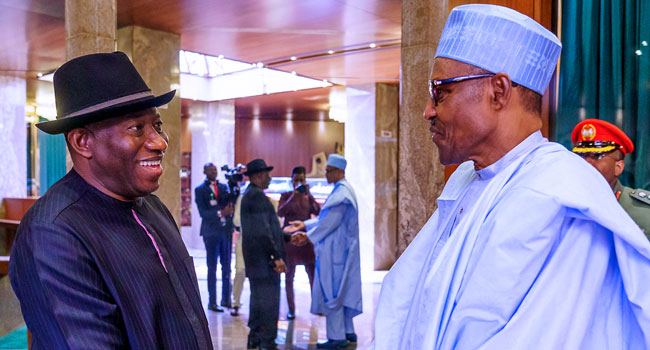Nigerians don’t need permit to demonstrate in public interest matters – Falana

Mr. Femi Falana (SAN) has faulted position of the Attorney General of the Federation (AGF) and Minister of Justice, Mr. Lateef Fagbemi (SAN), that the proposed protest by the Nigeria Labour Congress (NLC) and Trade Union Congress (TUC) over the current harsh economic conditions in the country is in breach of the order of court.
Following astronomical increase in the prices of basic necessities occasioned by the free fall of the naira in relation to major foreign currencies, the umbrella body of workers in Nigeria, NLC, had scheduled a nationwide protest for February 27 and 28.
Responding at the weekend, the federal government, through the AGF, warned against the planned demonstration, arguing that it is in violation of a court order and would amount to contempt of court. The AGF gave the warning in a letter dated February 23, which was addressed to Falana.
However, Falana in his reply to Fagbemi, dated February 24, argued that there was no order restraining labour from embarking on the February 27 and 28 protest over worsening economic conditions.
The rights activist argued that the threat of the AGF was baseless, since he had withdrawn the contempt proceedings filed against NLC and TUC for embarking on public protest on August 2, 2023.
Falana stated, “We submit, without any fear of contradiction, that the proposed public protest of the NLC is not contemptuous of the two exparte orders of the National Industrial Court (NIC). In particular, the issue of contempt does not arise, as the NLC has challenged the jurisdiction of the NIC to entertain the substantive case.
“It is further submitted that the NIC has not restrained the members of the NLC from exercising their fundamental rights to freedom of assembly and freedom of expression to protest against the excruciating economic pains being experienced by the masses.”
The senior lawyer recalled that following the removal of fuel subsidy by President Bola Tinubu on May 29, 2023, the federal government had commenced negotiations with the two workers’ unions, as the subsidy removal policy had brought untold hardship to Nigerians.
Falana recalled that while the negotiations were in progress, the Federal Ministry of Justice rushed to the NIC to file suit No NICN/ABJ/158/2023 between the Federal Government of Nigeria & Anor. v Nigeria Labour Congress & Anor in respect of the same issues.
He stated, “On June 5, 2023, Justice Yemi Anuwe granted the application of the federal government for an exparte order to restrain the NLC and TUC from embarking on strike against the removal of fuel subsidy. Although both the NLC and TUC complied with the exparte order, they promptly filed an application to set aside same for want of jurisdiction.
“They equally asked for a stay of execution of the order exparte pending the determination of the motion. The application to set aside the exparte order filed by the defendants and the motion for interlocutory injunction filed by the claimants have not been considered, as parties resolved to settle the case out of court.
“Even though the parties signed a 16-point memorandum of understanding, the federal government did not implement all the terms of the agreement. Hence, on August 2, 2023, both NLC and TUC held a peaceful protest throughout the country.”
Falana also pointed out that instead of implementing the agreement, the government initiated contempt proceedings against NLC and TUC at the industrial court, whose competence the unions challenged.
He explained, “However, the federal government turned round to withdraw the application for contempt. On November 10, 2023, the federal government filed another suit, No NICN/ABJ/322/20 23 between Federal Government of Nigeria & Anor. at the National Industrial Court against the NLC and TUC, notwithstanding the pendency of suit no NICN/ABJ/158/2 023.
“On that same day, the president court, Justice Benedict Kanyip, granted an ex parte order to restrain the NLC and TUC from embarking on the planned strike. However, His Lordship directed that the case file be transferred to Justice Yemi Anuwe, who is handling a similar labour dispute between the same parties.
“Both NLC and TUC challenged the competence of the fresh suit on the ground that it constitutes a gross abuse of court process, inter alia. The application has not been heard and determined by the NIC.”
Falana maintained that having withdrawn the contempt proceedings filed against the NLC and TUC for embarking on public protest on August 2, 2023, Fagbemi ought not to have threatened the NLC with contempt of court over its plan to hold rallies against the astronomical cost of living in the country.
Citing the case of Inspector General of Police v All Nigeria Peoples Party (200 8) 12 WRN 65, Falana observed that the Court of Appeal upheld the fundamental right of Nigerians to protest on matters of public interest without police permit.
In the lead judgement of the court, Olufunmilayo Adekeye JCA (as she then was) held inter alia, “The right to demonstrate and the right to protest on matters of public concern are rights which are in the public interest and that which individuals must possess, and which they should exercise without impediment as long as no wrongful act is done…
“If as speculated by law enforcement agents that breach of the peace would occur, our criminal code has made adequate provisions for sanctions against breakdown of law and order so that the requirement of permit as a conditionality to holding meetings and rallies can no longer be justified in a democratic society.”
According to Falana, since the freedom of speech and freedom of assembly are part of the democratic rights of every citizen of Nigeria, the Court of Appeal further held that the legislature must guard these rights jealously as they are part of the foundation upon which the government itself rests.
He stated that consequently, the National Assembly had ensured that the right of aggrieved citizens to protest peacefully for or against the government was protected.
Falana said section 83 (4) of the Police Establishment Act 2020, which provided that where a person or organisation notified the police of his or its intention to hold a public meeting, rally or procession on a public highway or such meetings in a place where the public had access to, the police officer responsible for the area shall mobilise personnel to provide security.
He added in the letter, “While we have advised the members of the NLC to conduct the rallies scheduled for February 27-28, 2024 in a peaceful manner, we urge you to use your good offices to direct the IG to provide adequate security to the conveners and participants in the protest in line with the provisions of Section 83(4) of the Police Establishment Act.”
The AGF had urged the NLC to shelve its proposed nationwide protest on the grounds that the protest would amount to contempt of court.
On February 16, NLC announced a nationwide protest scheduled for February 27 and 28, in response to the economic challenges facing the country. This decision followed the expiration of a 14-day ultimatum issued to the federal government regarding the widespread hardship.
But Fagbemi, in a letter addressed to Falana, reminded NLC of a subsisting order restraining the union from embarking on any industrial action, saying it is antithetical to the mediatory engagements leading to the execution of the agreement.









